Burt A. The Evolution of the British Empire and Commonwealth From the American Revolution
Подождите немного. Документ загружается.

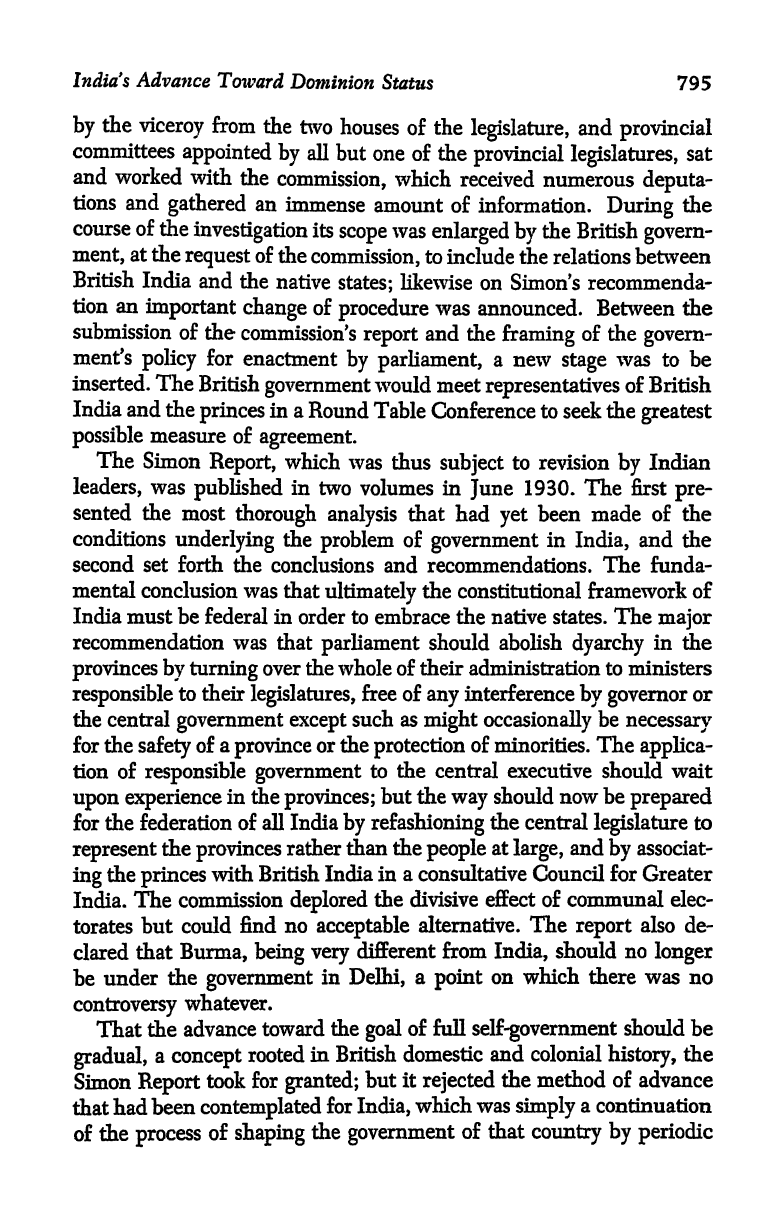
India's
Advance
Toward
Dominion
Status
795
by
the
viceroy
from
the
two
houses
of
the
legislature,
and
provincial
committees
appointed
by
all
but
one
of
the
provincial
legislatures,
sat
and
worked
with
the
commission,
which
received numerous
deputa-
tions
and
gathered
an
immense
amount of
information.
During
the
course
of
the
investigation
its
scope
was
enlarged by
the
British
govern-
ment,
at
the
request
of
the
commission,
to
include the relations
between
British
India
and
the
native
states;
likewise
on Simon's
recommenda-
tion
an
important
change
of
procedure
was announced. Between
the
submission
of
the
commission's
report
and the
framing
of the
govern-
ment's
policy
for
enactment
by parliament,
a new
stage
was
to be
inserted. The
British
government
would meet
representatives
of
British
India
and the
princes
in a
Round
Table
Conference to seek
the
greatest
possible
measure
of
agreement.
The Simon
Report,
which
was
thus
subject
to
revision
by
Indian
leaders,
was
published
in
two
volumes in
June
1930.
The first
pre-
sented the
most
thorough
analysis
that
had
yet
been
made of the
conditions
underlying
the
problem
of
government
in
India,
and
the
second
set
forth the
conclusions
and recommendations.
The funda-
mental
conclusion
was that
ultimately
the constitutional
framework
of
India must
be federal in order
to embrace
the
native states. The
major
recommendation
was
that
parliament
should abolish
dyarchy
in the
provinces by turning
over
the
whole of
their administration to ministers
responsible
to their
legislatures,
free
of
any
interference
by
governor
or
the central
government
except
such as
might
occasionally
be
necessary
for the
safety
of
a
province
or the
protection
of minorities.
The
applica-
tion of
responsible
government
to
the
central executive
should
wait
upon
experience
in the
provinces;
but the
way
should
now be
prepared
for
the
federation of
all India
by
refashioning
the central
legislature
to
represent
the
provinces
rather
than the
people
at
large,
and
by
associat-
ing
the
princes
with British India
in
a
consultative Council for Greater
India.
The
commission
deplored
the
divisive
effect
of communal
elec-
torates
but could
find no
acceptable
alternative.
The
report
also de-
clared
that
Burma,
being
very
different
from
India,
should
no
longer
be
under
the
government
in
Delhi,
a
point
on which there
was
no
controversy
whatever.
That
the advance
toward
the
goal
of full
self-government
should be
gradual,
a
concept
rooted
in British
domestic
and colonial
history,
the
Simon
Report
took
for
granted;
but
it
rejected
the
method
of
advance
that
had
been
contemplated
for
India,
which was
simply
a
continuation
of
the
process
of
shaping
the
government
of
that
country by periodic
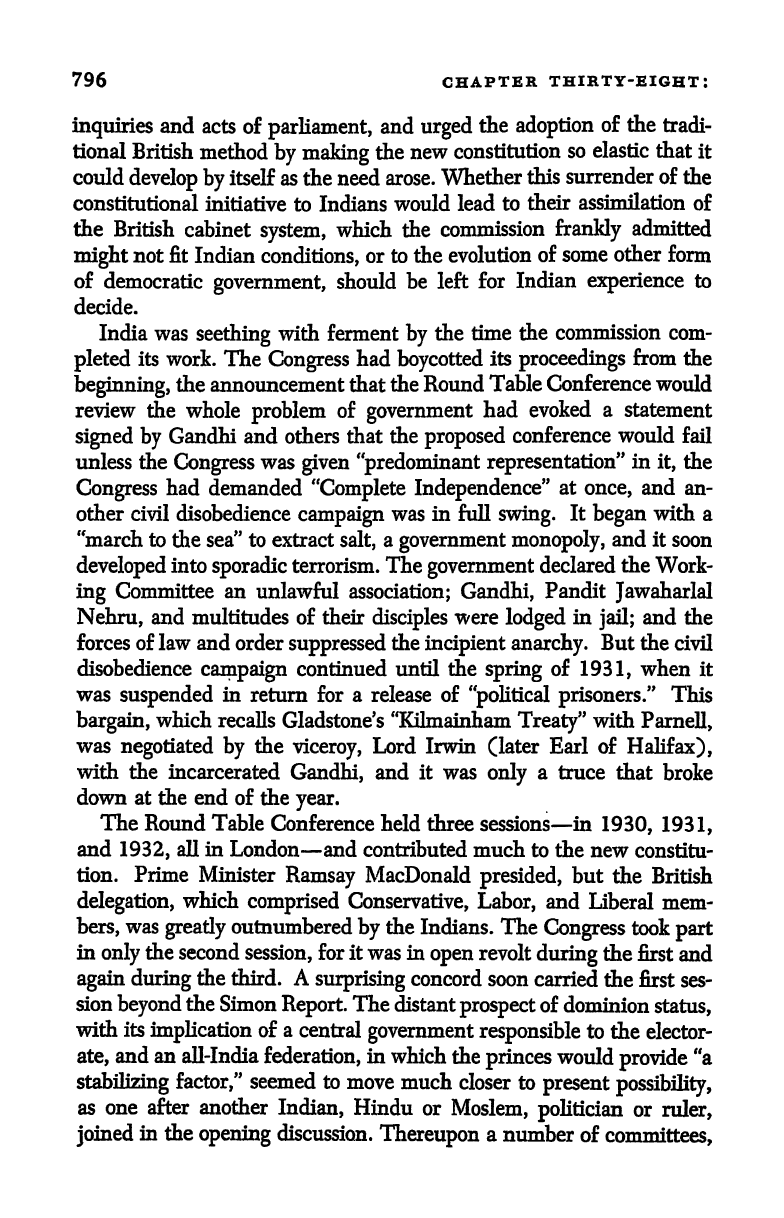
796
CHAPTER THIRTY-EIGHT:
inquiries
and
acts
of
parliament,
and
urged
the
adoption
of the
tradi-
tional
British
method
by making
the
new constitution
so
elastic
that
it
could
develop
by
itself as
the
need arose. Whether
this
surrender
of
the
constitutional
initiative
to Indians
would
lead
to
their
assimilation
of
the
British
cabinet
system,
which
the
commission
frankly
admitted
might
not
fit
Indian
conditions,
or to the
evolution
of
some
other
form
of
democratic
government,
should
be left
for
Indian
experience
to
decide.
India was
seething
with ferment
by
the
time
the
commission com-
pleted
its work.
The
Congress
had
boycotted
its
proceedings
from
the
beginning,
the announcement
that
the Round
Table Conference
would
review the
whole
problem
of
government
had evoked
a
statement
signed by
Gandhi and others that
the
proposed
conference would
fail
unless
the
Congress
was
given
"predominant
representation"
in
it,
the
Congress
had demanded
"Complete
Independence"
at
once,
and
an-
other civil disobedience
campaign
was
in full
swing.
It
began
with
a
"march
to
the
sea" to extract
salt,
a
government
monopoly,
and it
soon
developed
into
sporadic
terrorism. The
government
declared
the
Work-
ing
Committee
an
unlawful
association;
Gandhi,
Pandit
Jawaharlal
Nehru,
and multitudes of their
disciples
were
lodged
in
jail;
and the
forces of law
and
order
suppressed
the
incipient
anarchy.
But
the
civil
disobedience
campaign
continued
until
the
spring
of
1931,
when it
was
suspended
in
return
for
a
release of
"political prisoners."
This
bargain,
which recalls
Gladstone's "Kilmainham
Treaty"
with
Parnell,
was
negotiated
by
the
viceroy,
Lord
Irwin
(later
Earl of
Halifax),
with the
incarcerated
Gandhi,
and
it was
only
a truce
that
broke
down at
the end of
the
year.
The
Round Table
Conference held three sessions in
1930,
1931,
and
1932,
all
in
London and
contributed much
to the
new
constitu-
tion.
Prime
Minister
Ramsay
MacDonald
presided,
but the
British
delegation,
which
comprised
Conservative,
Labor,
and
Liberal mem-
bers,
was
greatly
outnumbered
by
the
Indians. The
Congress
took
part
in
only
the
second
session,
for it
was in
open
revolt
during
the
first
and
again
during
the
third. A
surprising
concord
soon
carried
the
first ses-
sion
beyond
the
Simon
Report.
The
distant
prospect
of
dominion
status,
with its
implication
of
a
central
government responsible
to
the
elector-
ate,
and an
all-India
federation,
in
which
the
princes
would
provide
"a
stabilizing
factor,"
seemed to
move
much
closer to
present
possibility,
as
one after another
Indian,
Hindu or
Moslem,
politician
or
ruler,
joined
in
the
opening
discussion.
Thereupon
a
number
of
committees,
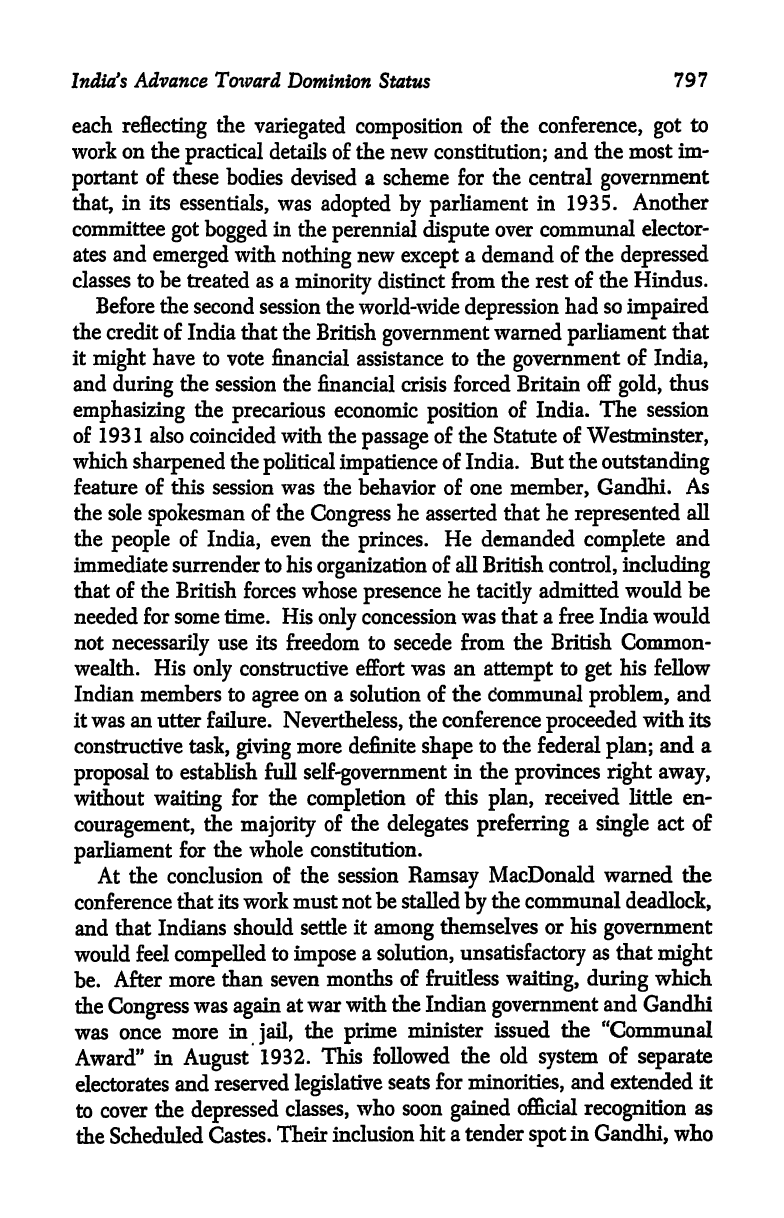
India's
Advance
Tmvard
Dominion Status
797
each
reflecting
the
variegated composition
of
the
conference,
got
to
work
on
the
practical
details of the new
constitution;
and
the
most
im-
portant
of
these
bodies
devised
a
scheme for
the central
government
that,
in its
essentials,
was
adopted
by parliament
in 1935.
Another
committee
got
bogged
in
the
perennial dispute
over communal
elector-
ates and
emerged
with
nothing
new
except
a
demand of
the
depressed
classes to be
treated
as a
minority
distinct from
the
rest of the
Hindus.
Before the
second session
the world-wide
depression
had
so
impaired
the credit of
India that the
British
government
warned
parliament
that
it
might
have to
vote
financial assistance
to
the
government
of
India,
and
during
the
session
the
financial
crisis
forced
Britain off
gold,
thus
emphasizing
the
precarious
economic
position
of India.
The
session
of 1931
also
coincided
with
the
passage
of
the Statute of
Westminster,
which
sharpened
the
political impatience
of India. But
the
outstanding
feature of
this
session was the behavior of one
member,
Gandhi.
As
the sole
spokesman
of the
Congress
he asserted that
he
represented
all
the
people
of
India,
even
the
princes.
He demanded
complete
and
immediate surrender
to his
organization
of all
British
control,
including
that of
the
British
forces whose
presence
he
tacitly
admitted would
be
needed for some time.
His
only
concession
was that a free India would
not
necessarily
use its
freedom
to secede from the
British
Common-
wealth.
His
only
constructive
effort
was
an
attempt
to
get
his fellow
Indian
members
to
agree
on a solution of the
communal
problem,
and
it was
an
utter
failure.
Nevertheless,
the
conference
proceeded
with its
constructive
task,
giving
more definite
shape
to
the
federal
plan;
and a
proposal
to
establish full
self-government
in the
provinces
right
away,
without
waiting
for
the
completion
of
this
plan,
received
little
en-
couragement,
the
majority
of
the
delegates
preferring
a
single
act of
parliament
for
the
whole
constitution.
At
the conclusion of the
session
Ramsay
MacDonald
warned the
conference
that
its
work must
not
be
stalled
by
the
communal
deadlock,
and
that Indians
should
settle
it
among
themselves or
his
government
would
feel
compelled
to
impose
a
solution,
unsatisfactory
as that
might
be.
After more
than seven
months
of fruitless
waiting, during
which
the
Congress
was
again
at
war with
the Indian
government
and
Gandhi
was
once
more
in
jail,
the
prime
minister issued
the
"Communal
Award"
in
August
1932.
This
followed
the
old
system
of
separate
electorates
and
reserved
legislative
seats
for
minorities,
and
extended
it
to cover
the
depressed
classes,
who soon
gained
official
recognition
as
the Scheduled
Castes.
Their
inclusion
hit a tender
spot
in
Gandhi,
who
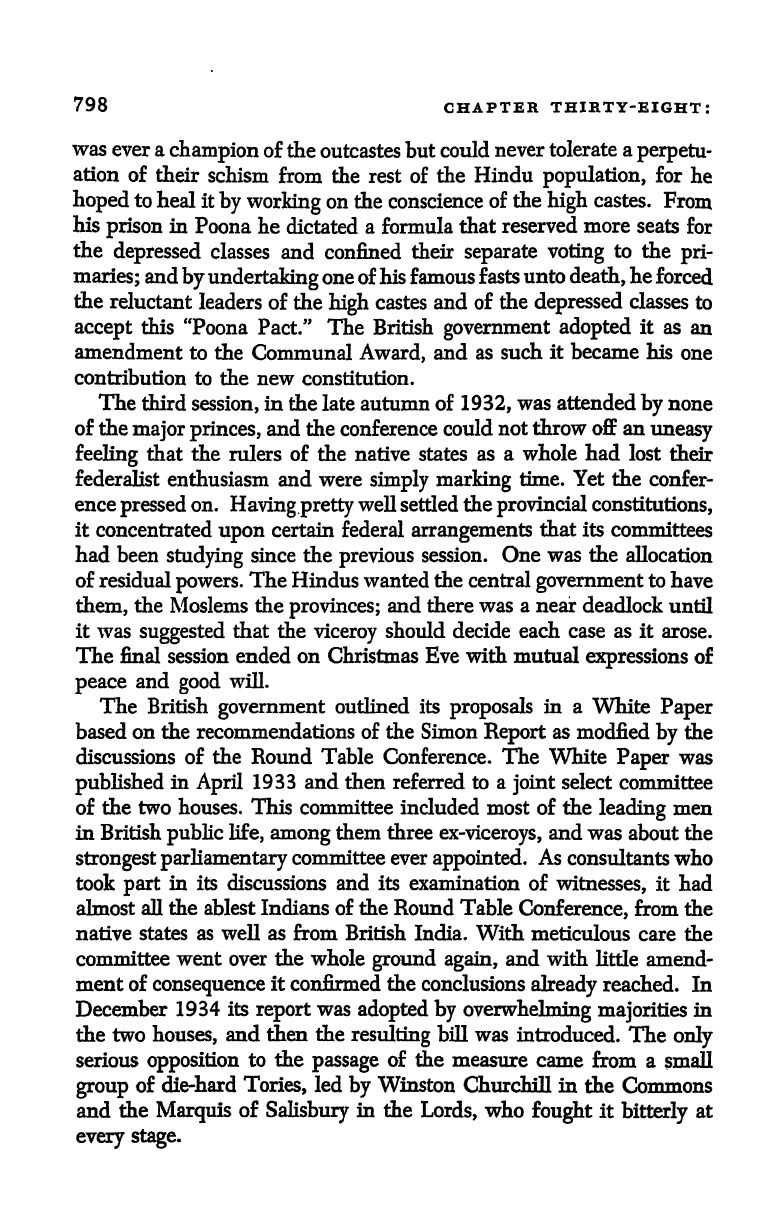
798
CHAPTER
THIRTY-EIGHT:
was
ever a
champion
of
the outcastes but
could
never tolerate a
perpetu-
ation
of
their
schism
from the rest of
the
Hindu
population,
for
he
hoped
to heal it
by
working
on
the
conscience
of
the
high
castes.
From
his
prison
in
Poona he
dictated
a
formula
that
reserved
more
seats
for
the
depressed
classes
and
confined
their
separate
voting
to
the
pri-
maries;
and
by
undertaking
one of
his famous
fasts
unto
death,
he
forced
the
reluctant
leaders of the
high
castes and of
the
depressed
classes
to
accept
this
"Poona
Pact."
The British
government
adopted
it
as
an
amendment to the
Communal
Award,
and
as
such
it
became his
one
contribution
to
the new
constitution.
The
third
session,
in the
late
autumn of
1932,
was attended
by
none
of
the
major
princes,
and
the
conference
could
not throw
off
an
uneasy
feeling
that the
rulers of the
native states
as a
whole
had
lost
their
federalist enthusiasm and were
simply marking
time.
Yet
the
confer-
ence
pressed
on.
Having
pretty
well settled
the
provincial
constitutions,
it concentrated
upon
certain federal
arrangements
that its
committees
had
been
studying
since the
previous
session. One
was the
allocation
of residual
powers.
The
Hindus wanted
the central
government
to
have
them,
the
Moslems
the
provinces;
and
there
was a near
deadlock
until
it
was
suggested
that
the
viceroy
should
decide
each case as it
arose.
The final session ended
on
Christmas
Eve with mutual
expressions
of
peace
and
good
will.
The British
government
outlined
its
proposals
in a
White
Paper
based on
the recommendations of the Simon
Report
as
modfied
by
the
discussions
of the Round Table Conference. The
White
Paper
was
published
in
April
1933 and then referred to
a
joint
select committee
of
the two houses. This committee
included most of
the
leading
men
in British
public
life,
among
them
three
ex-viceroys,
and
was
about
the
strongest
parliamentary
committee ever
appointed.
As
consultants who
took
part
in its
discussions and its examination of
witnesses,
it
had
almost
all
the
ablest
Indians of
the
Round Table
Conference,
from the
native
states as
well
as
from British India. With
meticulous
care the
committee
went
over the whole
ground
again,
and
with
little
amend-
ment of
consequence
it
confirmed
the
conclusions
already
reached.
In
December
1934 its
report
was
adopted by
overwhelming majorities
in
the two
houses,
and
then the
resulting
bill was
introduced.
The
only
serious
opposition
to the
passage
of the
measure
came
from a
small
group
of
die-hard
Tories,
led
by
Winston
Churchill
in
the Commons
and
the
Marquis
of
Salisbury
in
the
Lords,
who
fought
it
bitterly
at
every
stage.
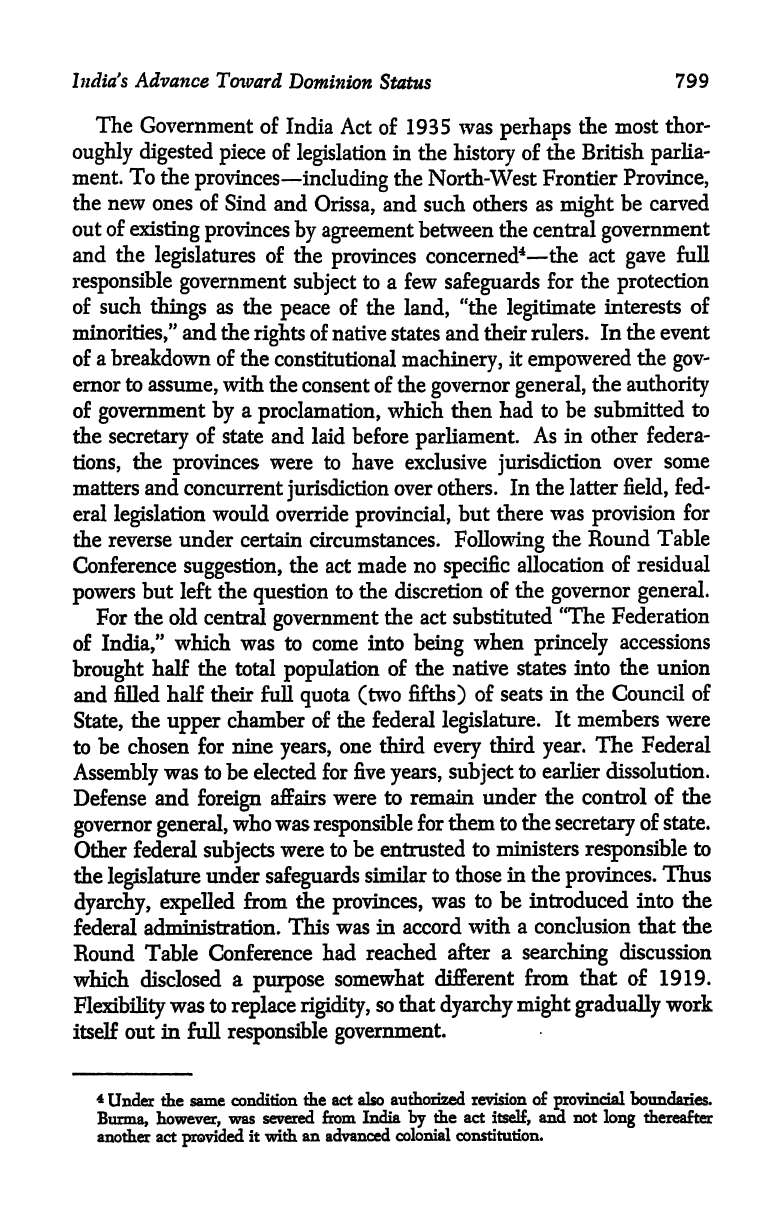
India's Advance
Toward
Dominion Status
799
The
Government
of
India
Act
of
1935
was
perhaps
the
most
thor-
oughly
digested
piece
of
legislation
in
the
history
of the
British
parlia-
ment. To the
provinces
including
the North-West
Frontier
Province,
the
new
ones
of
Sind
and
Orissa,
and such
others
as
might
be
carved
out of
existing
provinces
hy
agreement
between
the central
government
and the
legislatures
of the
provinces
concerned
4
the
act
gave
full
responsible
government
subject
to a few
safeguards
for
the
protection
of such
things
as
the
peace
of the
land,
"the
legitimate
interests
of
minorities,"
and the
rights
of native
states
and
their
rulers.
In
the event
of
a
breakdown
of
the
constitutional
machinery,
it
empowered
the
gov-
ernor to
assume,
with the
consent of
the
governor
general,
the
authority
of
government
by
a
proclamation,
which
then
had to be
submitted
to
the
secretary
of
state
and
laid
before
parliament.
As
in
other
federa-
tions,
the
provinces
were
to
have exclusive
jurisdiction
over
some
matters
and
concurrent
jurisdiction
over others.
In
the latter
field,
fed-
eral
legislation
would override
provincial,
but
there
was
provision
for
the reverse under certain
circumstances.
Following
the
Round
Table
Conference
suggestion,
the act made no
specific
allocation
of residual
powers
but
left
the
question
to
the
discretion
of
the
governor
general.
For
the old
central
government
the
act substituted
"The
Federation
of
India,"
which was to come into
being
when
princely
accessions
brought
half the total
population
of
the
native states
into
the union
and filled
half
their
full
quota
(two
fifths)
of seats
in the Council of
State,
the
upper
chamber
of the federal
legislature.
It members
were
to be
chosen
for
nine
years,
one third
every
third
year.
The Federal
Assembly
was
to be
elected for
five
years,
subject
to earlier dissolution.
Defense
and
foreign
affairs
were
to remain
under the control
of
the
governor general,
who was
responsible
for
them to
the
secretary
of
state.
Other
federal
subjects
were to
be entrusted
to
ministers
responsible
to
the
legislature
under
safeguards
similar
to
those
in the
provinces.
Thus
dyarchy,
expelled
from
the
provinces,
was
to be introduced into the
federal
administration.
This
was in accord
with
a
conclusion
that
the
Round Table Conference
had
reached
after a
searching
discussion
which disclosed
a
purpose
somewhat
different
from
that
of 1919.
Flexibility
was to
replace rigidity,
so
that
dyarchy might
gradually
work
itself
out
in
full
responsible
government.
4
Under the
same
condition
the
act
also
authorized revision of
provincial
boundaries.
Burma, however,
was
severed
from
India
by
the act
itself,
and
not
long
thereafter
another
act
provided
it with
an
advanced
colonial constitution.
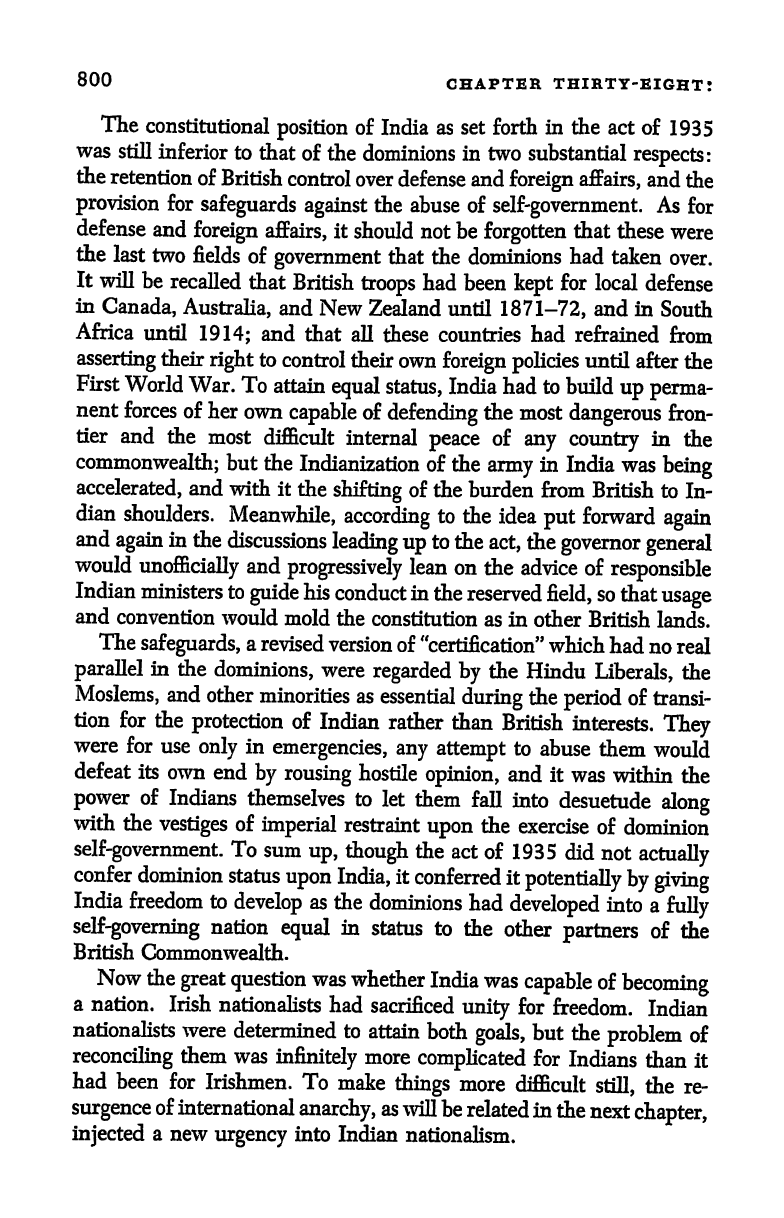
800
CHAPTER
THIRTY-EIGHT:
The
constitutional
position
of
India
as
set forth
in the
act
of
1935
was
still
inferior
to
that
of
the
dominions
in
two
substantial
respects:
the
retention
of
British
control
over
defense and
foreign
affairs,
and
the
provision
for
safeguards
against
the abuse of
self-government.
As
for
defense
and
foreign
affairs,
it
should
not
be
forgotten
that
these
were
the
last
two
fields
of
government
that the
dominions
had
taken
over.
It
will
be
recalled
that
British
troops
had
been
kept
for local
defense
in
Canada,
Australia,
and
New
Zealand until
1871-72,
and in
South
Africa
until
1914;
and
that
all
these
countries had
refrained
from
asserting
their
right
to
control
their
own
foreign
policies
until
after
the
First
World
War.
To
attain
equal
status,
India had to build
up
perma-
nent
forces
of
her
own
capable
of
defending
the most
dangerous
fron-
tier
and
the
most
difficult
internal
peace
of
any
country
in
the
commonwealth;
but the
Indianization of
the
army
in
India
was
being
accelerated,
and
with it
the
shifting
of the
burden
from
British
to
In-
dian
shoulders.
Meanwhile,
according
to
the idea
put
forward
again
and
again
in
the
discussions
leading up
to
the
act,
the
governor
general
would
unofficially
and
progressively
lean
on
the advice
of
responsible
Indian
ministers
to
guide
his
conduct in
the
reserved
field,
so that
usage
and
convention
would
mold
the
constitution
as in other
British
lands.
The
safeguards,
a
revised
version
of
"certification" which
had
no
real
parallel
in
the
dominions,
were
regarded
by
the
Hindu
Liberals,
the
Moslems,
and other
minorities
as
essential
during
the
period
of
transi-
tion for
the
protection
of
Indian
rather
than
British
interests.
They
were
for
use
only
in
emergencies,
any
attempt
to
abuse
them
would
defeat
its own
end
by
rousing
hostile
opinion,
and it
was
within
the
power
of
Indians
themselves
to
let
them
fall
into
desuetude
along
with the
vestiges
of
imperial
restraint
upon
the
exercise
of
dominion
self-government.
To sum
up,
though
the
act
of
1935
did
not
actually
confer
dominion
status
upon
India,
it
conferred
it
potentially
by
giving
India
freedom to
develop
as the
dominions
had
developed
into
a
fully
self-governing
nation
equal
in
status
to
the
other
partners
of
the
British
Commonwealth.
Now
the
great question
was
whether
India
was
capable
of
becoming
a
nation.
Irish
nationalists
had
sacrificed
unity
for
freedom.
Indian
nationalists were
determined to
attain
both
goals,
but
the
problem
of
reconciling
them
was
infinitely
more
complicated
for
Indians
than it
had
been
for
Irishmen.
To
make
things
more
difficult
still,
the
re-
surgence
of
international
anarchy,
as
will
be
related in
the
next
chapter,
injected
a
new
urgency
into
Indian
nationalism.
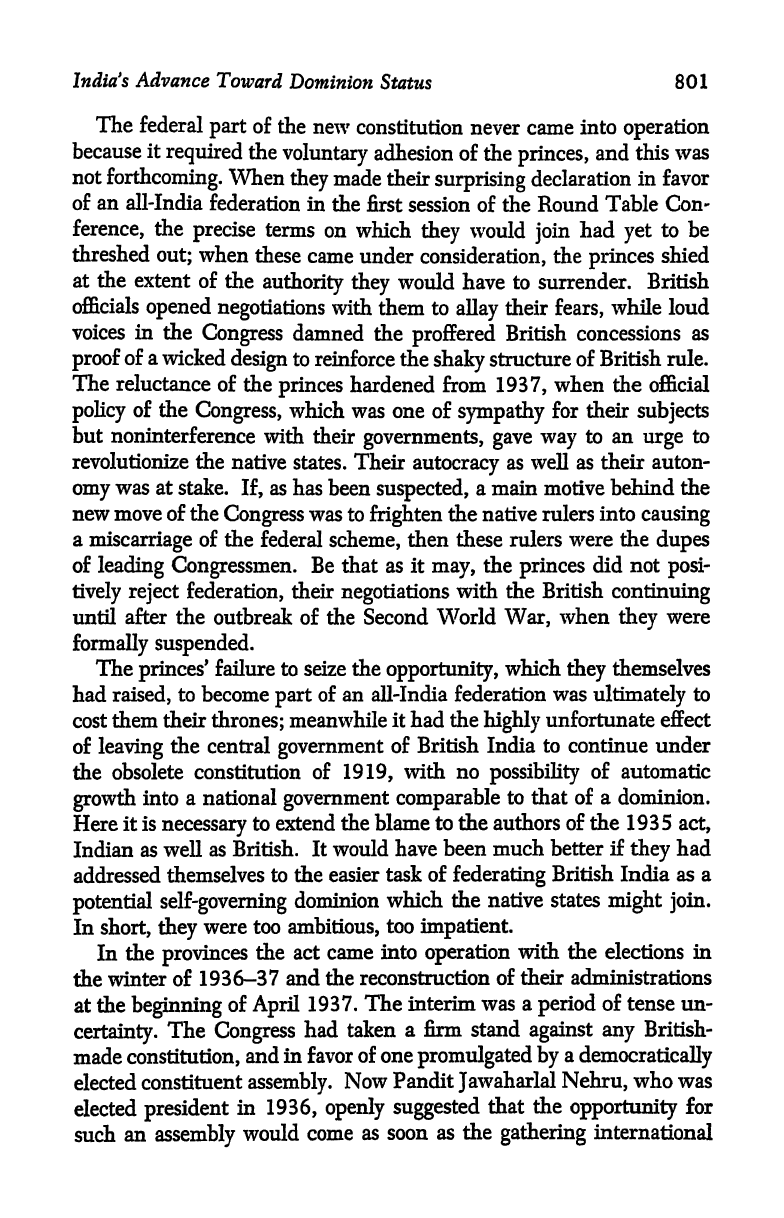
India's
Advance
Toward
Dominion
Status
801
The
federal
part
of
the new
constitution
never came
into
operation
because
it
required
the
voluntary
adhesion of
the
princes,
and
this
was
not
forthcoming.
When
they
made their
surprising
declaration
in favor
of
an
all-India
federation
in
the
first session of the
Round
Table
Con-
ference,
the
precise
terms
on
which
they
would
join
had
yet
to be
threshed
out;
when
these
came
under
consideration,
the
princes
shied
at
the
extent
of
the
authority
they
would
have to
surrender.
British
officials
opened
negotiations
with them to
allay
their
fears,
while
loud
voices
in
the
Congress
damned the
proffered
British concessions
as
proof
of
a
wicked
design
to
reinforce the
shaky
structure
of
British rule.
The
reluctance
of
the
princes
hardened
from
1937,
when
the official
policy
of the
Congress,
which was one
of
sympathy
for their
subjects
but
noninterference with their
governments, gave
way
to an
urge
to
revolutionize
the
native states. Their
autocracy
as well
as their
auton-
omy
was at stake.
If,
as has been
suspected,
a main motive
behind
the
new move
of
the
Congress
was
to
frighten
the
native rulers into
causing
a
miscarriage
of the
federal
scheme,
then these rulers
were
the
dupes
of
leading Congressmen.
Be that as
it
may,
the
princes
did
not
posi-
tively reject
federation,
their
negotiations
with
the
British
continuing
until
after
the
outbreak of
the
Second World
War,
when
they
were
formally suspended.
The
princes'
failure
to
seize the
opportunity,
which
they
themselves
had
raised,
to become
part
of
an
all-India
federation was
ultimately
to
cost
them their
thrones;
meanwhile it had
the
highly
unfortunate
effect
of
leaving
the central
government
of
British
India to continue
under
the
obsolete
constitution of
1919,
with no
possibility
of automatic
growth
into
a
national
government
comparable
to that
of
a
dominion.
Here
it
is
necessary
to
extend
the blame
to the authors of
the 1935
act,
Indian
as
well
as
British. It
would have
been
much
better
if
they
had
addressed
themselves
to the easier
task of
federating
British India as a
potential
self-governing
dominion
which
the native states
might
join.
In
short,
they
were too
ambitious,
too
impatient.
In
the
provinces
the act came
into
operation
with the elections
in
the
winter of
1936-37
and the
reconstruction
of
their
administrations
at the
beginning
of
April
1937.
The
interim
was a
period
of
tense
un-
certainty.
The
Congress
had taken
a
firm
stand
against
any
British-
made
constitution,
and
in
favor
of one
promulgated
by
a
democratically
elected
constituent
assembly.
Now
Pandit
Jawaharlal
Nehru,
who was
elected
president
in
1936,
openly
suggested
that
the
opportunity
for
such
an
assembly
would
come
as
soon as
the
gathering
international
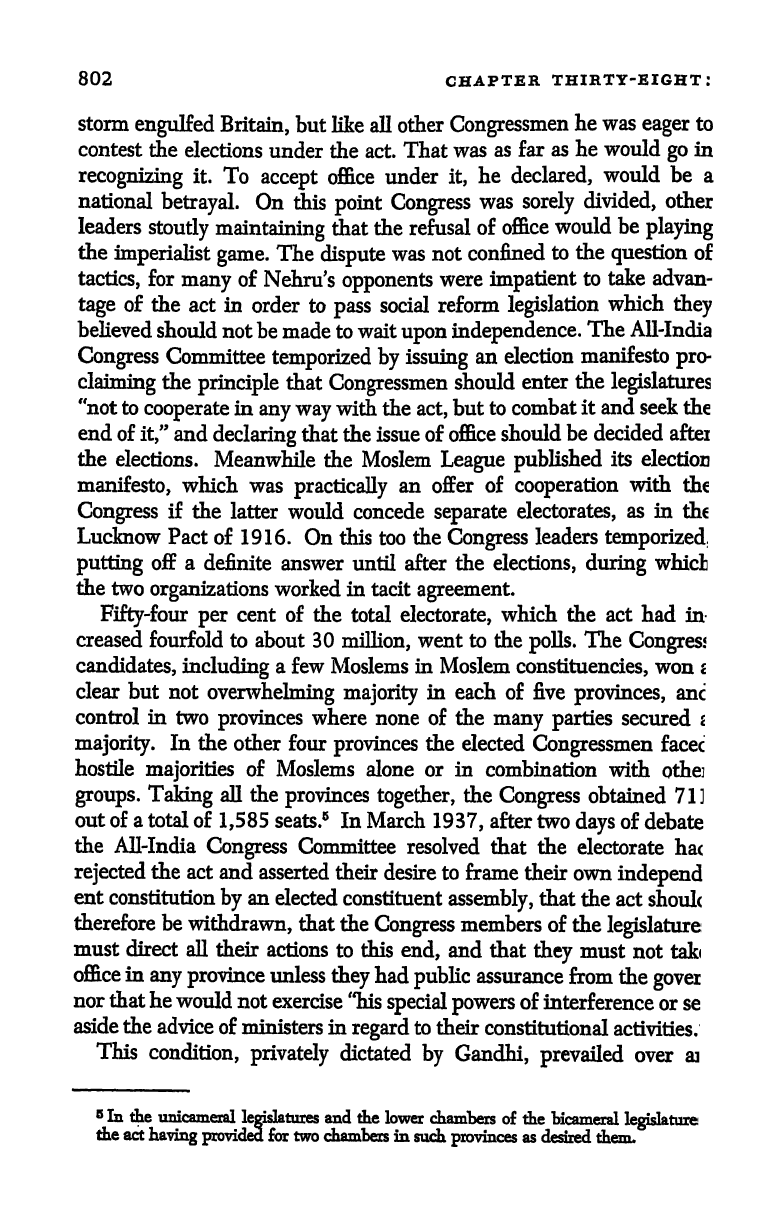
802
CHAPTER
THIRTY-EIGHT:
storm
engulfed
Britain,
but like all other
Congressmen
he was
eager
to
contest
the
elections
under the act.
That
was
as
far
as he
would
go
in
recognizing
it.
To
accept
office
under
it,
he
declared,
would
be
a
national
betrayal.
On
this
point Congress
was
sorely
divided,
other
leaders
stoutly
maintaining
that the
refusal
of
office
would
be
playing
the
imperialist
game.
The
dispute
was
not
confined
to
the
question
of
tactics,
for
many
of
Nehru's
opponents
were
impatient
to
take
advan-
tage
of the
act
in
order to
pass
social reform
legislation
which
they
believed
should not
be
made
to
wait
upon
independence.
The
All-India
Congress
Committee
temporized by issuing
an
election
manifesto
pro-
claiming
the
principle
that
Congressmen
should
enter
the
legislatures
"not
to
cooperate
in
any way
with
the
act,
but
to
combat
it and
seek
the
end
of
it,"
and
declaring
that the
issue
of
office
should
be decided
aftei
the
elections.
Meanwhile
the
Moslem
League
published
its
election
manifesto,
which was
practically
an
offer
of
cooperation
with
the
Congress
if
the latter
would concede
separate
electorates,
as in
the
Lucknow Pact
of
1916.
On
this
too
the
Congress
leaders
temporized,
putting
off
a
definite answer
until
after
the
elections,
during
which
the
two
organizations
worked
in tacit
agreement.
Fifty-four
per
cent of
the total
electorate,
which
the act had
in
creased
fourfold to
about
30
million,
went to the
polls.
The
Congress
candidates,
including
a
few
Moslems
in
Moslem
constituencies,
won t
clear but
not
overwhelming majority
in each
of five
provinces,
anc
control
in
two
provinces
where
none
of the
many
parties
secured
i
majority.
In the
other four
provinces
the
elected
Congressmen
facec
hostile
majorities
of Moslems alone
or
in
combination
with
othe]
groups.
Taking
all
the
provinces
together,
the
Congress
obtained
71]
out of a
total of
1,585
seats.
5
In March
1937,
after two
days
of
debate
the
All-India
Congress
Committee
resolved
that
the
electorate
hac
rejected
the act
and
asserted their
desire
to
frame their
own
independ
ent
constitution
by
an
elected constituent
assembly,
that
the
act
shoulc
therefore be
withdrawn,
that
the
Congress
members
of the
legislature
must
direct
all their
actions
to this
end,
and
that
they
must
not
taki
office
in
any
province
unless
they
had
public
assurance
from
the
gover
nor
that
he
would not
exercise "his
special
powers
of
interference or se
aside
the
advice
of ministers in
regard
to
their
constitutional
activities.
This
condition,
privately
dictated
by
Gandhi,
prevailed
over ai
5
In
the
unicameial
legislatures
and the
lower
chambers
of the
bicameral
legislature
die act
having
provided
for two
chambers
in
such
provinces
as
desired
them.

India's
Advance
Toward
Dominion
Status
803
amendment
to
prohibit
acceptance
on
any
terms,
and
was
inspired
by
a
naive belief
that
the
governors
would
somehow
find
a
loophole
to
accommodate
the
well-known
anxiety
o
the
majority
leaders in
the
"Congress
provinces"
to
take
office.
A
more
careful
reading
of
the
act
would
have
revealed
that
there
was
no
such
loophole,
and
this soon
became
apparent
when
these
gentlemen
were
invited
to
become
pre-
miers
and
had
to
refuse
because
no
governor
could
give
the
prescribed
assurance.
Thereupon
the
governors
of
these
provinces
fell
back
upon
the
only
immediate
but
essentially
unstable
alternative
of
appointing
minority
leaders
to
form
cabinets;
Gandhi,
publicly
admitting
his
sole
paternity
of
the obstructive
formula,
declared
that
he
had
not
intended
to
impose
an
impossible
condition.
Some
Congressmen
hailed
the
dead-
lock
as
hastening
the
day
of
deliverance
from
British
rule,
but
they
were
a
dwindling
minority.
The
Congress
legislative
majorities
grew
more
impatient
to
seize
the
reins
of
government
that
had been
offered
to
them.
How
much
they
could do
with
these
reins,
they
and
other
Congressmen
saw
in
the
non-Congress
provinces,
where
full
responsible
government
was
operating.
The
viceroy
also
greatly
helped
to
break
the
deadlock.
In
a
strong
appeal
to the
people
of
India
to
work the
constitu-
tion
for
all
it
was
worth,
he
pointed
out that
the
safeguards
were so
limited
in
scope
that
they
could
not
interfere
with
normal
government.
In
July
the
A.I.C.C. waived
the
impossible
condition,
the
interim
ministries
resigned,
and
Congress
ministries
took
their
place.
All
eleven
provinces
now
enjoyed
a
measure
of
self-government
sub-
stantially
equal
to
that
of a
Canadian
province
or
an
Australian
state
or,
for
that matter,
of
an
American
state;
and
their
capacity
to
manage
their
own
affairs
was
demonstrated
during
the
period
of more
than
two
years
before
the
Second
World War.
The
parliamentary system
worked,
though
not
in
precisely
the
same
way
as
in
other
commonwealth
countries,
because
Indian
conditions
were
different.
The
governors,
for
example,
commonly
met
with their
cabinets
and
gave
them
the
benefit
of a
longer
and
wider
experience.
Only
once
did
a
governor
refuse
to
follow the
advice
of his
responsible
ministers,
and
they
soon
withdrew
their
consequent
resignation.
No
governor
attempted
to
legislate by
ordinance.
Only
once
did a
governor
block a
bill,
and that
was
on
the
advice
of
his
ministers
to
save
their
face.
On
several
occasions
gover-
nors
reserved
bills
for
consideration
by
the
governor
general,
and
of
these measures
only
five were
vetoed
while others
were
returned with
recommendations
for
amendment,
which
were then
adopted.
The
supreme
test of
the new
system
was the
maintenance
of
law
and
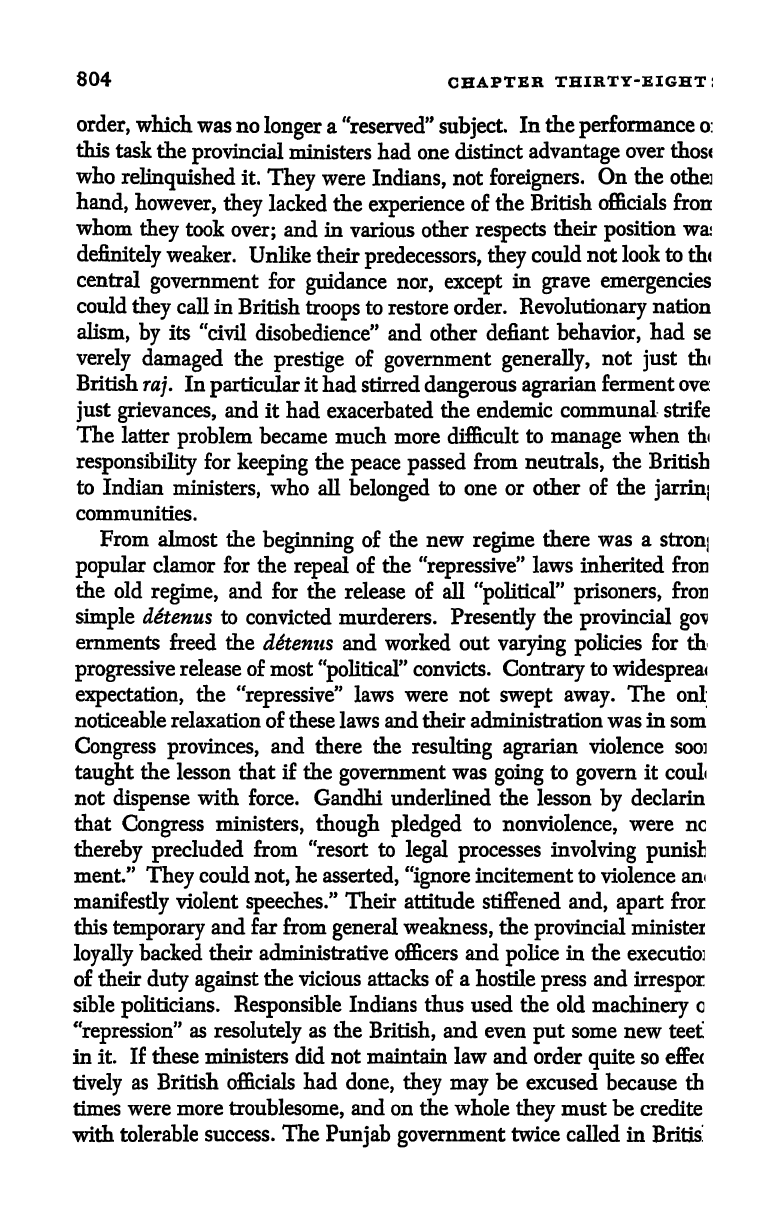
804
CHAPTER
THIRTY-EIGHT;
order,
which was
no
longer
a
"reserved"
subject.
In
the
performance
o:
this
task
the
provincial
ministers had
one distinct
advantage
over
those
who
relinquished
it.
They
were
Indians,
not
foreigners.
On
the
othe:
hand,
however,
they
lacked
the
experience
of
the British
officials
fron
whom
they
took
over;
and in
various other
respects
their
position
wai
definitely
weaker.
Unlike
their
predecessors,
they
could not
look to th<
central
government
for
guidance
nor,
except
in
grave
emergencies
could
they
call in
British
troops
to
restore order.
Revolutionary
nation
alism,
by
its
"civil
disobedience" and other
defiant
behavior,
had se
verely
damaged
the
prestige
of
government
generally,
not
just
th<
British
raj.
In
particular
it
had
stirred
dangerous
agrarian
ferment
ove
just
grievances,
and
it
had exacerbated
the
endemic
communal
strife
The
latter
problem
became
much more difficult
to
manage
when
th<
responsibility
for
keeping
the
peace passed
from
neutrals,
the
British
to
Indian
ministers,
who all
belonged
to one or
other of
the
jarrinj
communities.
From
almost the
beginning
of
the new
regime
there
was
a
stron]
popular
clamor
for the
repeal
of the
"repressive"
laws inherited fron
the
old
regime,
and for
the
release
of all
"political"
prisoners,
fron
simple
detenus
to
convicted
murderers.
Presently
the
provincial go\
ernments
freed
the
detenus and
worked
out
varying
policies
for
th
progressive
release of
most
"political"
convicts.
Contrary
to
widesprea<
expectation,
the
"repressive"
laws
were
not
swept away.
The
onl
noticeable relaxation of these
laws
and
their
administration was
in som
Congress provinces,
and
there the
resulting
agrarian
violence sooi
taught
the
lesson that
if the
government
was
going
to
govern
it
couL
not
dispense
with
force. Gandhi
underlined
the
lesson
by
declarin
that
Congress
ministers,
though
pledged
to
nonviolence,
were
nc
thereby precluded
from
"resort to
legal
processes
involving
punisl
ment."
They
could
not,
he
asserted,
"ignore
incitement to
violence
am
manifestly
violent
speeches."
Their
attitude stiffened
and,
apart
fror
this
temporary
and
far from
general
weakness,
the
provincial
ministei
loyally
backed their administrative officers and
police
in
the
executioi
of their
duty
against
the
vicious attacks of
a
hostile
press
and
irrespor
sible
politicians.
Responsible
Indians thus
used
the
old
machinery
c
"repression"
as
resolutely
as the
British,
and even
put
some
new teet
in
it. If these
ministers
did
not maintain
law
and order
quite
so
effec
tively
as British officials
had
done,
they
may
be excused
because th
times
were more
troublesome,
and on
the whole
they
must
be
credite
with
tolerable
success.
The
Punjab government
twice
called in
Britis
